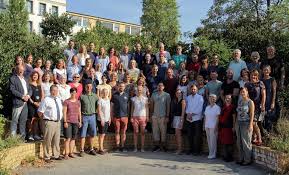Rückert-grammar school
 3
3
 2020-12-14 15:30:40
2020-12-14 15:30:40
Company address
Location:
Germany, Berlin , Mettestraße 8, 10825 Berlin, Germany
Service types
Education
Language Courses
English Course
Spanish Course
German Course
French Course
Secondary Education
Gymnasium
About company
Born: May 18, 1788, died: January 31, 1866
Professor of Oriental Languages,
Poet of patriotic "German (r) poems", Biedermeier "house and annual poetry" and personal experiences reflecting grief and love poetry
Translator and writer of Persian-Arabic poetry
Literary studies locates Rückert in the “area of romanticism” and likes to quote him as a contemporary and friend of August Graf von Platen.
The fact that Rückert's name is completely absent in some literary stories stands in remarkable contrast to a statement by Goethe about Rückert (recorded by Eckermann):
"... which poet he thinks a lot and seems to have the best expectations."
Friedrich Rückert was born in Schweinfurt, grew up in several rural towns in the Franconian area and attended the grammar school in Schweinfurt as a boarding school student from 1802 to 1805. He was considered to be extremely hardworking. In 1805 Rückert "inscribed" himself as a law student in Würzburg, actually attended legal courses, but very soon turned mainly to studying philology, ie classical philology, i.e. Greek and Latin. In 1808 he continued his studies in Heidelberg, but at the latest there completely neglected his legal studies. In order to get closer to the goal of an academic teaching activity, Rückert moved to Jena, wrote his dissertation here in 1810 "Dissertatio philologica-philosophica de idea philologiae",
In 1811, Rückert completed his habilitation in Jena, and from 1811 to 1812 he also worked as a private lecturer at the university there, where he held courses in Greek and Latin literature.
During his time in Jena, Rückert dealt with the idea of coming closer to what he assumed was his real destiny, namely that of the writer, without being burdened by a professional activity. Because of this, he gave up teaching in Jena and lived in different places in the vicinity of Coburg and in Würzburg until 1815. He wrote numerous dramas, especially comedies, whose lack of artistic quality he himself was aware of, and wrote a large number of poems, such as his patriotic "Mocking and Honor Songs" and "Geharrnischte (n) Sonnette" as well as those of his own Complexes of poetry marked “Agnes' Totenfeier” and “Amaryllis”.
In 1815 Rückert took the position of editor of the Cottaschen "Morgenblatt (s) für educated estates" in Stuttgart, which seemed to offer him material security and the freedom for literary activity. In 1817 he gave up his journalistic activity due to disagreements with colleagues in the editorial team and the publisher and began a trip to Italy, which took him to Rome, often following in Goethe's footsteps. From this trip Rückert expected new stimuli for his further literary work. During the trip some "Italian poems" were written.
On the return journey from Italy, Rückert stayed in Vienna until 1819, where he devoted himself to studying Arabic, Persian and Turkish languages and literature. He then returned to his parents near Coburg, where he continued and expanded his oriental studies.
Rückert seems to have been a linguistic genius who was able to learn a new language in just six to eight weeks. His method was as simple and effective as it was laborious: he copied thick textbooks and dictionaries, as he once wrote himself,
"Partly because I don't have the money to buy it, partly to take the whole vocabulary in the shortest possible way, if not in my memory, ... but to let it pass before the performance."
He once named as his main philological studies:
“Greek books and German, Latin, Slavic, French. Persian including Sanskrit, Turkish, Arabic too. "
He also learned the following languages:
Hebrew, Syriac, Aramaic, Coptic, Berber, Albanian, Lithuanian, Finnish, Ethiopian, Afghan, Old Persian, Malay, Armenian, various South Indian languages, English, Italian, Spanish, Portuguese.
There is an undated anecdote about this:
Once in July a missionary came to Rückert with the request to teach him Talmul (a South Indian language). Rückert promised him - but only for the winter semester: by then he had to learn the language himself.
In addition to his oriental studies, he was responsible for the editing of a regularly published “women's pocket book (s)”, which gave him a certain material independence.
In the years 1819/20, under the influence of Persian language studies, he completed the poetry collection “Eastern Roses”, and under the impression of acquaintance with his future wife, the poem complex “Love Spring”. After his marriage at the end of 1821, he moved to Coburg, where he continued his language studies, which from 1823 at the latest became more important to him than literary production. In 1826 Rückert was finally appointed professor of oriental studies at the University of Erlangen. In addition to his teaching activities, he translated or transferred a variety of oriental poetry into German.
From 1836 to 1839 he published his main work “The Wisdom of the Brahmin”, his own poetry, which was influenced in the form of oriental literature, but is not a translation or rewrite. Already in the early thirties, under the impression of the death of two of his children, the "Kindertotenlieder."
In 1841 Rückert was appointed professor of oriental languages in Berlin and at the same time appointed to the secret council. His publications were essentially limited to the field of oriental studies. Some renewed attempts as a playwright failed again.
The Vossische Zeitung of April 9th, 1908 contains the following assessment by Rudolf Genée about Rückert's stay in Berlin:
“But not only to the rural idyll of Neuseß, but also to the small and quiet Erlangen, Berlin was already in too strong contrast for the intelligent poet, linguist and nature lover to feel comfortable. Worst of all, however, was that he was by no means suitable for academic teaching in that he - as his closest friends had to testify to their regret - completely forgot in his lectures that he had an audience in front of him and more and more so quietly spoke to himself as if nobody needed to hear it. The consequence of this was that the number of his listeners kept decreasing both in the classroom and later in his apartment. Rückert initially lived in Berlin on Schulgartenstrasse, as the part of today's Königgrätzer Strasse between the Brandenburg and Potsdamer Tor was called back then. A few years later he took up his apartment on Behrenstrasse, on the corner of Kleine Mauerstrasse. He has not lacked in friendly relationships and visits from outside. But while his academic activity could not give him satisfaction for the reasons given, the conditions in public and social life in the big city had become deeply antipathetic to him. "
In 1848 Rückert retired at his own request, and he retired to his now acquired country estate in Neuses near Coburg. Until his death in 1866 he devoted himself to the oriental languages, especially the translation from them. It was not until 1887 that the Koran, which he translated into German and provided with notes, appeared. 




































 Post ad
Post ad 















